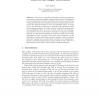Free Online Productivity Tools
i2Speak
i2Symbol
i2OCR
iTex2Img
iWeb2Print
iWeb2Shot
i2Type
iPdf2Split
iPdf2Merge
i2Bopomofo
i2Arabic
i2Style
i2Image
i2PDF
iLatex2Rtf
Sci2ools
95
Voted
ECML
2003
Springer
2003
Springer
Learning Context Free Grammars in the Limit Aided by the Sample Distribution
We present an algorithm for learning context free grammars from positive structural examples (unlabeled parse trees). The algorithm receives a parameter in the form of a finite set of structures and the class of languages learnable by the algorithm depends on this parameter. Every context free language belongs to many such learnable classes. A second part of the algorithm is then used to determine this parameter (based on the language sample). By Gold’s theorem, without introducing additional assumptions, there is no way to ensure that, for every language, the parameter chosen by the learner will make the language learnable. However, we show that determining the parameter based on the sample distribution is often reasonable, given some weak assumptions on this distribution. Among other things, repeated learning, where one learner learns the language the previous learner converged to, is guaranteed to produce a learnable language after a finite number of steps. This set of limit lan...
| Added | 06 Jul 2010 |
| Updated | 06 Jul 2010 |
| Type | Conference |
| Year | 2003 |
| Where | ECML |
| Authors | Yoav Seginer |
Comments (0)

